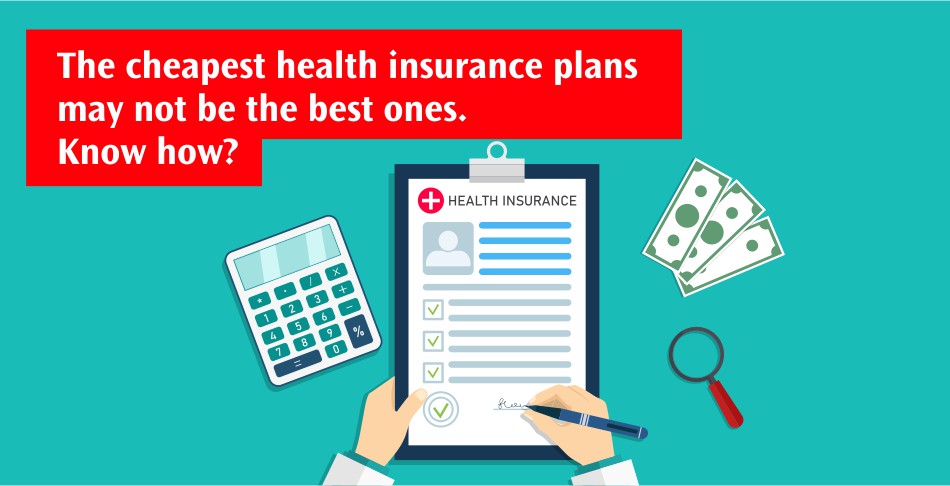The Cheapest Health Insurance Plans May Not Be the Best Ones. Know How?
The Cheapest Health Insurance Plans May Not Be the Best Ones. Know How?
Published on April 7, 2021. EST READ TIME: 3 minutes

In the past two decades, healthcare prices have skyrocketed and the market for health insurance has risen as a result. Those covered by health insurance policies obtain coverage for medical, surgical and prescription drugs. Insurance companies either reimburse the insured or pay the medical care provider directly. As a payment needing to be fulfilled on a recurrent basis, subscribing to health insurance can be financially draining. Rather than avoiding health insurance entirely or selecting the least expensive plan available, it is paramount that individuals do adequate research. This is because there exists a broad gamut of health insurance plans available and individuals should seek out those that actually maximise their benefits & that are relevant to their medical profile.
The least expensive health insurance policy might be financially appealing, but they more often than not tend to make for poor investment decisions. The following reasons highlight how these inexpensive plans skimp on providing for the insured.
➔ Claim Settlement Ratio – This ratio highlights just how many claims an insurance company settles against the claims they receive. Inexpensive health insurance plans might not have high claim settlement ratios which can be very difficult to deal with in the future should the insured need to have their healthcare covered.
➔ Limited Range of Hospitals and Doctors Covered – The network of hospitals and doctors that operate within low health insurance policies tends to be fairly limited. This could be problematic as individuals might need to avail of the services of a doctor not included in their plan. Furthermore, they may have a preexisting relationship with a doctor for which they may not be able to receive a claim purely because said doctor isn’t a part of the policies network. Doctors and hospitals included in the policy might be more obscure which might not elicit much faith in the insured of their capabilities.
➔ Furthermore, inexpensive medical insurance policies might not cover a wide range of medical issues that any given individual could run into. This is problematic as individuals can’t always anticipate what healthcare they might need in the future.
➔ No Claim Bonus – This bonus allows insured individuals to benefit from benefits and / or discounted premiums if they don’t avail of any claims for a year. Low-cost health insurance plans might not provide their policyholders with these bonuses. If they do, the cumulative bonus or discount on the premium could be limited.
➔ Inexpensive health insurance policies might not allow for multiple individuals to be included in a plan. This could be problematic for young families in particular who might want to group their medical expenses.
➔ Several expenses associated with medical care might not be covered by inexpensive health insurance schemes. Pre and post hospitalisation fees, transportation costs and day-care expenses might not be accounted for in low-cost policies which could lead to additional, unwanted expenses in the future should medical care be required.
➔ Inadequate co-payment clause – Co-payment refers to the amount of money which the insured individual will bear in the event of being hospitalised. This amount will not be covered by their medical insurance. Inexpensive health insurance policies might allocate a greater percentage to be devoted to co-payments which can be financially draining.
➔ Lifetime renewability might not be available for lowly priced health insurance policies. Individuals who continue to invest in such policies are likely to incur greater expenses in the future as a result of needing to find new plans once the existing ones expire. Lifetime renewability is paramount as healthcare is something whose requirement increases with time.
Prior to selecting a health insurance policy, it is vital that individuals do their research such that they make informed decisions that don’t cost them in the future. Inexpensive health insurance policies need to be adequately pored
over, as they might not cover several important aspects of healthcare that an individual might require.
Disclaimer: The above information is for illustrative purpose only. For more details, please refer to policy wordings and prospectus before concluding the sales.
RELATED ARTICLES
Is Small Business Health Insurance Cheaper Than Individual?
Are there Health Insurance Plans with No Waiting Period?
High Deductible Health Plans: Pros and Cons of HDHPs
Women-Centric Insurance Plans: Here is Why You Need Them
Learn How to Choose Between Disease-Specific and Critical Illness Insurance Plans










 Health Insurance
Health Insurance  Travel Insurance
Travel Insurance  Car Insurance
Car Insurance  Cyber Insurance
Cyber Insurance  Critical Illness Insurance
Critical Illness Insurance
 Pet Insurance
Pet Insurance
 Bike/Two Wheeler Insurance
Bike/Two Wheeler Insurance  Home Insurance
Home Insurance  Third Party Vehicle Ins.
Third Party Vehicle Ins.  Tractor Insurance
Tractor Insurance  Goods Carrying Vehicle Ins.
Goods Carrying Vehicle Ins.  Passenger Carrying Vehicle Ins.
Passenger Carrying Vehicle Ins.  Compulsory Personal Accident Insurance
Compulsory Personal Accident Insurance  Travel Insurance
Travel Insurance  Rural
Rural 











